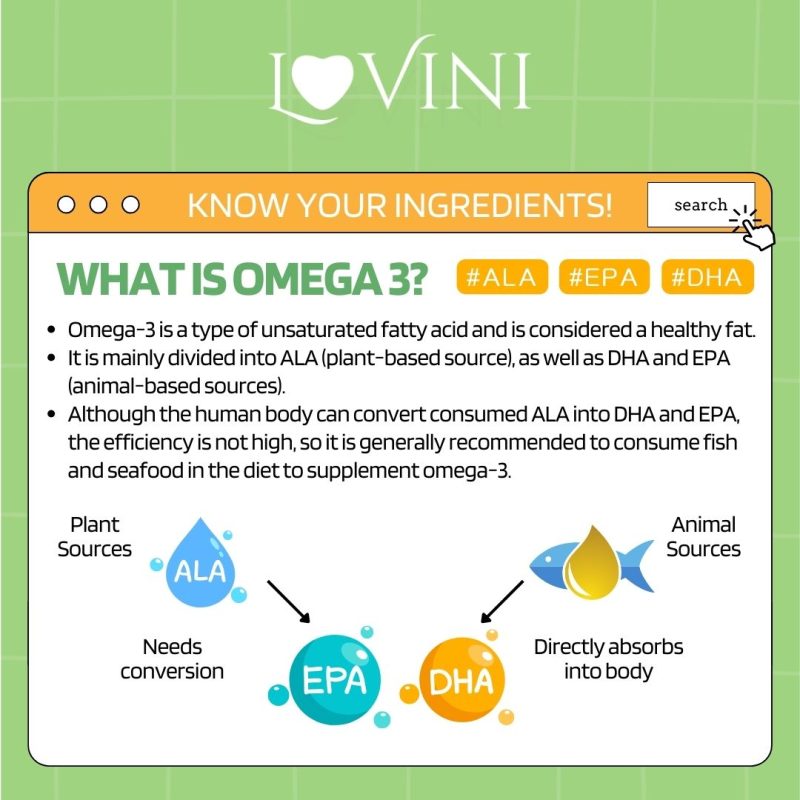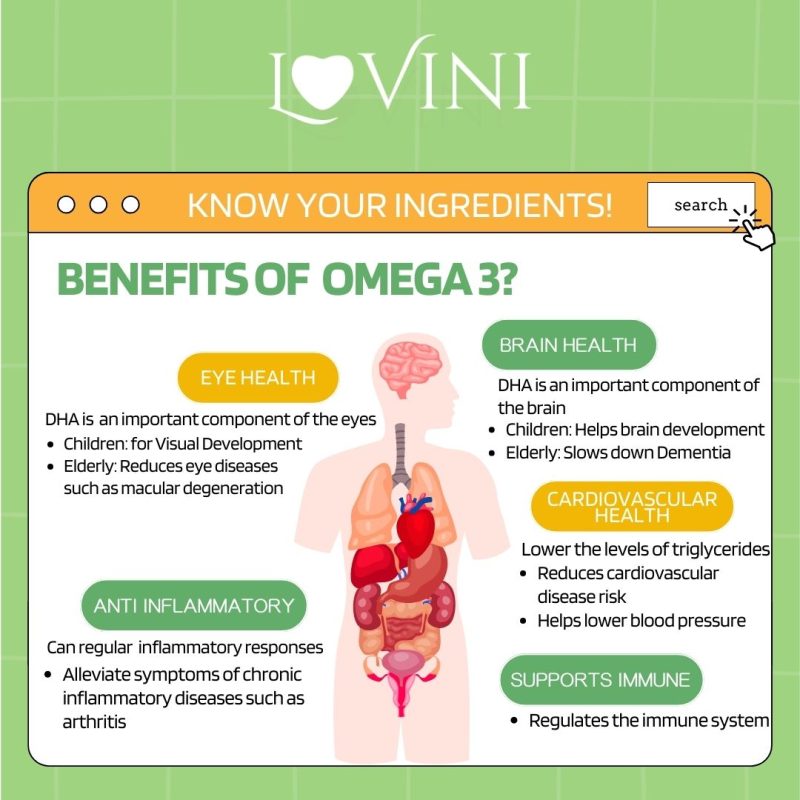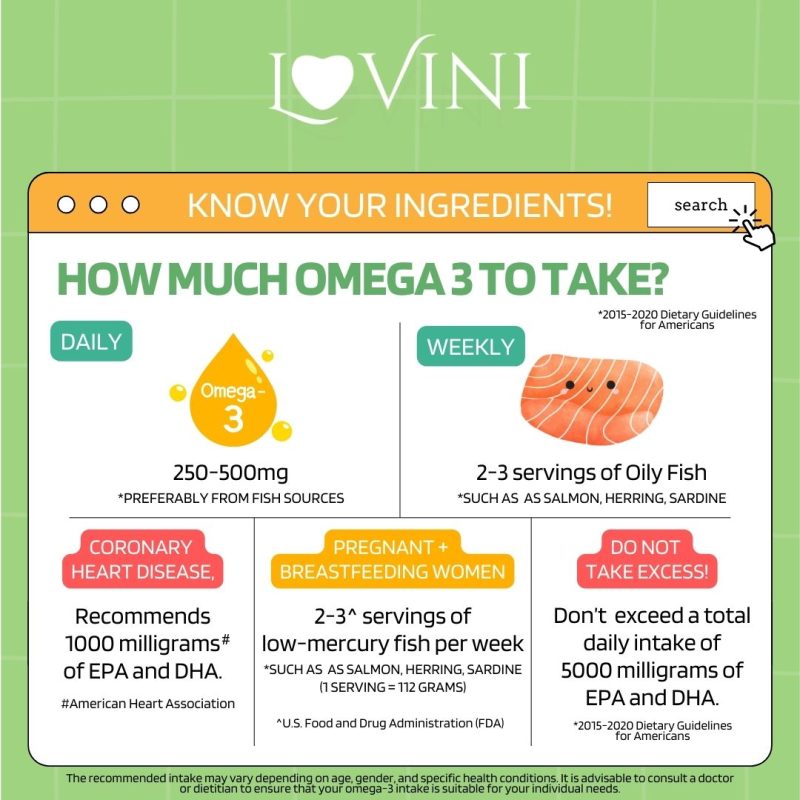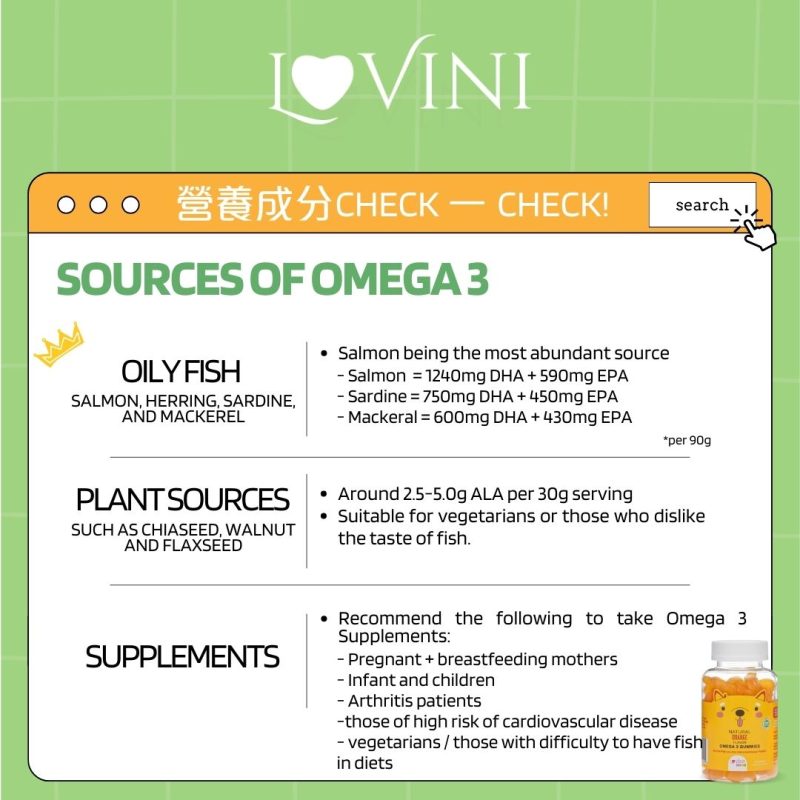Uncategorized
【奧米加3知多啲! | Know Your Ingredients: Omega 3】
What are the health benefits of Omega 3? What’s the difference between DHA, EPA and ALA? How can we get more omega 3 in our daily diet? Continue reading as we’ve got answers to your questions about Omega 3!
What is Omega 3?

Omega-3 is a type of unsaturated fatty acid and is considered a healthy fat. It is mainly divided into ALA (plant-based source), as well as DHA and EPA (animal-based sources). Although the human body can convert consumed ALA into DHA and EPA, the efficiency is not high, so it is generally recommended to consume fish and seafood in the diet to supplement omega-3.
Benefits of Omega-3

- Improves cardiovascular health: Omega-3 helps lower blood pressure and reduce the risk of heart disease and stroke. It can lower the levels of triglycerides (a type of fat in the blood) while increasing the levels of high-density lipoprotein (good cholesterol), thereby improving the balance of blood lipids.
- Anti-inflammatory effects: Omega-3 has a regulatory effect on inflammatory responses, which can alleviate symptoms of chronic inflammatory diseases such as arthritis, neurodegenerative diseases, and inflammatory bowel disease.
- Enhances brain function: DHA is an important component of brain tissue, and omega-3 helps support brain development and function. It is believed to have positive effects on cognitive function, memory, and emotional stability.
- Protects eye health: Omega-3 is also important for eye health. DHA is one of the main components of the retina, and it helps maintain vision and protect the eyes from age-related macular degeneration and other eye diseases.
- Supports the immune system: Omega-3 has a regulatory effect on immune system function, helping to resist infections and diseases. It can reduce the negative impact of chronic inflammation on the immune system and enhance the activity of immune cells.
How much Omega-3 should be consumed?

- The 2015-2020 Dietary Guidelines for Americans recommend a daily intake of 250-500 milligrams of omega-3 fatty acids, preferably from fish. Eating about 2-3 servings of oily fish per week can meet this requirement. If the dietary intake is insufficient, supplementation through nutritional supplements is also an option.
- For individuals with coronary heart disease, the American Heart Association recommends a daily intake of approximately 1000 milligrams of EPA and DHA.
- The U.S. Food and Drug Administration (FDA) recommends that pregnant and breastfeeding women consume 2-3 servings (1 serving = 112 grams) of low-mercury fish per week to support fetal and infant growth and development, such as salmon, herring, and sardines.
- However, it is important to be cautious about excessive intake of omega-3 fatty acids, as it may lead to low blood pressure, thinning of the blood, and excessive bleeding during injuries. It may also excessively suppress the inflammatory response and reduce immune function. Therefore, it is recommended not to exceed a total daily intake of 5000 milligrams of EPA and DHA.
The recommended intake may vary depending on age, gender, and specific health conditions. It is advisable to consult a doctor or nutritionist to ensure that your omega-3 intake is suitable for your individual needs.
What are the Sources of Omega 3?

- Oily fish: It is recommended to consume oily fish 2-3 times a week. Salmon, herring, sardines, and mackerel are particularly rich in DHA and EPA. Among them, salmon is the most abundant, with 1240 milligrams of DHA and 590 milligrams of EPA per 90 grams, while the same amount of sardines and mackerel contains 750 milligrams and 600 milligrams of DHA, respectively.
- Plant-based sources: Flaxseed oil, hemp oil, and sunflower seed oil are choices rich in omega-3 from plant sources. They contain approximately 2.5-5.0 grams of ALA per 30 grams. Suitable for vegetarians or those who dislike the taste of fish.
- Supplements: If the daily dietary intake of omega-3 is insufficient, consider taking omega-3 supplements. It is also recommended for pregnant and breastfeeding mothers, infants and young children, arthritis patients, individuals at high risk of cardiovascular disease, and vegetarians or those who have difficulty supplementing fish in their daily diet.
Frequently Asked Questions about Omega 3
- Do we need to consume Omega 3 every day?
Yes, omega-3 is an essential fatty acid, which means that our bodies cannot produce it on their own and therefore need to obtain it through diet or supplements. - Are there any side effects of Omega 3?
In general, omega-3 is safe and well-tolerated. However, high-dose omega-3 supplements may cause mild gastrointestinal discomfort such as nausea, diarrhea, or bloating. It is best to consult a doctor or nutritionist before using supplements. - When is the best time to take Omega 3 Supplements?
– Omega-3 supplements are usually better absorbed when taken with a meal that contains some dietary fat. This is because the presence of fat can enhance the absorption of the omega-3 fatty acids.
– If you are currently taking calcium or other medicine, it is recommended to take it at least 2-3 hours apart to avoid interaction with fatty acids and affect the absorption rate. - Is Omega 3 suitable for pregnant and breastfeeding women?
Omega-3 is crucial for the brain development of fetuses and infants. Pregnant and breastfeeding women should consume adequate amounts of omega-3 to support the growth and development of their babies. However, it is important to consult a healthcare professional for specific recommendations and to ensure the safety and appropriate dosage for individual circumstances. - Can I get Omega 3 from plant based sources alone?
Plant-based sources of omega-3 provide a type of omega-3 called alpha-linolenic acid (ALA). While ALA is beneficial, the conversion of ALA to the more bioavailable forms, such as EPA and DHA, is limited in the body. Therefore, it is generally recommended to obtain omega-3 from both plant-based and animal-based sources, especially fatty fish, to ensure an adequate intake of EPA and DHA. Alternatively, you can choose to supplement with Omega 3 supplements to ensure an adequate intake of Omega 3.
Lovini’s Recommendation
Reference
- National Institutes of Health. Omega-3 Fatty Acids – Fact Sheet for Health Professionals
- AbuMweis S, Abu Omran D, Al-Shami I, Jew S. The ratio of eicosapentaenoic acid to docosahexaenoic acid as a modulator for the cardio-metabolic effects of omega-3 supplements: A meta-regression of randomized clinical trials. Complement Ther Med. 2021;57:102662. doi:10.1016/j.ctim.2021.102662



